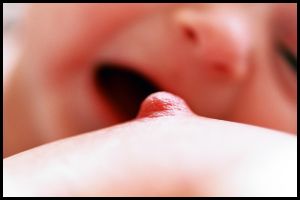By Christina Podolak

For most of our human existence on earth, mothers have fed their babies breast milk. Within the last 100 years, mothers had another option for feeding their babies: formula.
Mothers today are faced with the decision whether to formula feed or breastfeed their babies. Six years ago, I was one of those mothers. I was pregnant with my first child and went in for my first prenatal check-up. My doctor asked if I planned to bottle-feed or breastfeed my baby, and I didn’t hesitate to answer — breastfeed. The topic was never mentioned after that visit.
Why Breastfeed?
When asked a few years later why I wanted to breastfeed, I didn’t have a clear answer. I was aware of some of the health benefits to my infant, but formula processed from the milk of a cow or soybeans just didn’t seem natural or healthy. The cost savings was an obvious benefit, but I also had great breastfeeding role models in my family. My three older sisters as well as my mother had chosen to breastfeed through the first year of infancy. It wasn’t until I heard Dr. Jeanne Stolzer talk in Lincoln, Nebraska, in April 2009 that I fully understood the broad range of benefits available to my baby and me by choosing to breastfeed.
Stolzer is an associate professor and researcher of family studies at the University of Nebraska at Kearney. After hearing her talk about the overwhelming body of scientific evidence supporting breastfeeding, I couldn’t understand why if a mother was educated with this information, she would still choose formula without some sort of circumstance that would make breastfeeding medically impossible for either her or the baby. My concept of the importance of breastfeeding to the mother as well as the child was solidified. It made me feel even more passionate about sharing and education other mothers on the many benefits of breastfeeding.
Research is finding lifetime benefits for both the breastfeeding mother and baby. These benefits are a dose response-specific variable. This means that the outcome is different for each mother-child pair and is associated with the amount, intensity, and duration of the nursing experience. It can be compared to two persons, a regular drinker and a non-drinker: They can be given the same amounts of alcohol for the same length of time, but if one is used to drinking on a regular basis, he won’t be affected as much as the non-drinker. The specific breastfeeding benefits are affected by the amount of milk given, how long the nursing relationship is, and the intensity of nursing sessions. Research has found that the following health benefits to the mother included a reduced the risk for:
- Type I and II diabetes
- Anxiety
- Mood disorders
- Osteoporosis
- Breast, ovarian, and uterine cancer
- Depression rates
- Cholesterol.
The baby benefits from an overall reduced risk of death from all causes. Research has also found many more lifetime benefit for the baby which includes a reduced risk for:
- Upper and lower respiratory infections
- Ear infections
- Bacterial infections
- Urinary infections
- Asthma and allergies of all types
- Diarrhea
- Skin disorders
- Type I and II diabetes
- Celiac and bowel disease
- Cancer, especially lymphoma and leukemia.
Stolzer shared the statistics of health care savings by breastfeeding alone: $3.2 billion dollars would be saved on health care if all Americans breastfed for six months.
Getting This News to Mothers
The challenge is providing the needed education to new mothers still on the fence about breast or bottle-feeding, as well as eliciting positive support from medical staff. I think back to own experience with my first pregnancy. I wasn’t offered any information from my OB/GYN at my prenatal visits. I agree with Stolzer in that our hospital protocol needs to be changed. All hospitals need to go to the Baby Friendly guidelines and not offer any formula samples or pacifiers.
There also needs to be better prenatal education for the mother and father. This would include a class on breastfeeding as commonplace as childbirth classes, for both parents, so each would know what to expect and how to handle any possible challenges.
A Need for Cultural Acceptance
Better role models for breastfeeding on the cover of magazines and on television shows would be “worth a thousand words” toward building public acceptance for a practice that is as natural to a baby as crawling. How many times has a mother been shown breastfeeding a baby? Not many. There is always a bottle in the baby’s mouth. Rather than baby bottles being the symbol of “babyhood,” an infant wrapped in the warm embrace of his mother would prevail.
Generations of Change
How do we get women to realize the numerous benefits of breastfeeding? I believe education and ongoing support through the first difficult weeks of breastfeeding would move our culture to a time where a majority of women instinctively answer, “Breastfeed my baby, of course.” In the hospital where I delivered my three children, I have found that the doctors dictate protocol, and it can be intimidating to challenge the “expert.” But consider how births have changed in one or two generations. I can’t imagine being unconscious for my deliveries. It takes just a few mothers to intelligently challenge the way doctors choose to educate their patients. Then we can get back to 100 years ago when the majority of mothers breastfed their happy, healthy babies.
Discuss this topic with other API members and parents. Get advice for your parenting challenges, and share your tips with others on the API Forum.


 According to an article on Guadian.co.uk, “Postnatal Depression and Your Baby,” the length of a new mother’s postpartum depression has a strong tie with the difficulties she’ll experience in establishing a close attachment with her baby.
According to an article on Guadian.co.uk, “Postnatal Depression and Your Baby,” the length of a new mother’s postpartum depression has a strong tie with the difficulties she’ll experience in establishing a close attachment with her baby. Becoming a mother can be wonderful – and highly stressful. Sleepless nights, breastfeeding difficulties, a history of trauma, low partner support, or a baby with health problems are all stressors that can put you at risk for depression. Fortunately, there are some steps that you can take to help you cope.
Becoming a mother can be wonderful – and highly stressful. Sleepless nights, breastfeeding difficulties, a history of trauma, low partner support, or a baby with health problems are all stressors that can put you at risk for depression. Fortunately, there are some steps that you can take to help you cope. So many first-time moms are caught off-guard by their emotions after giving birth to the baby they’ve been waiting for months, even years, to join their family. It’s completely normal to feel a letdown after the big day. After all, childbirth is a life-changing experience in every way. What new moms and their partners need to do is understand how to recognize the “baby blues” and what can help until they go away…usually in a couple weeks.
So many first-time moms are caught off-guard by their emotions after giving birth to the baby they’ve been waiting for months, even years, to join their family. It’s completely normal to feel a letdown after the big day. After all, childbirth is a life-changing experience in every way. What new moms and their partners need to do is understand how to recognize the “baby blues” and what can help until they go away…usually in a couple weeks. An article on France’s InfosJuenes.com, “Risk of Maternal Depression on the Infant,” reveals research that shows the negative effects of depression in mothers on their babies.
An article on France’s InfosJuenes.com, “Risk of Maternal Depression on the Infant,” reveals research that shows the negative effects of depression in mothers on their babies.